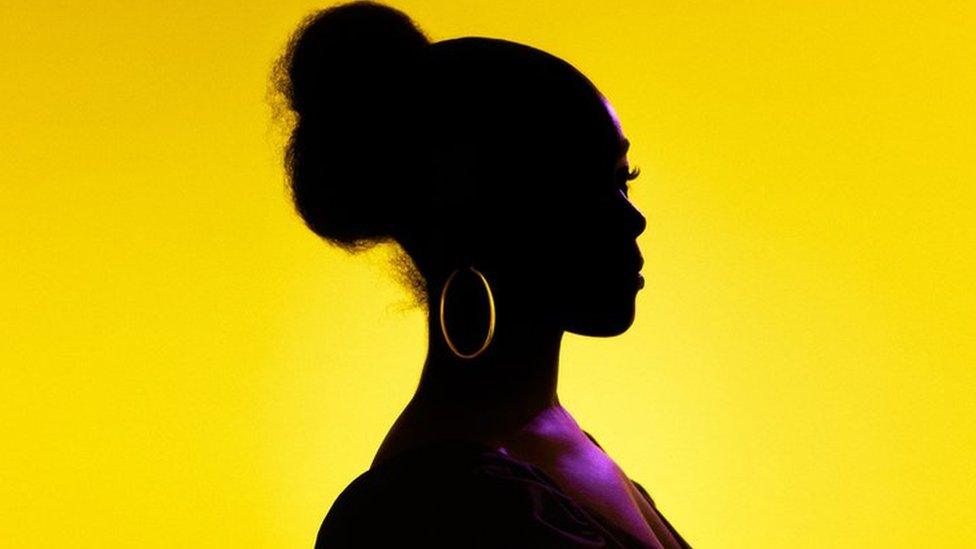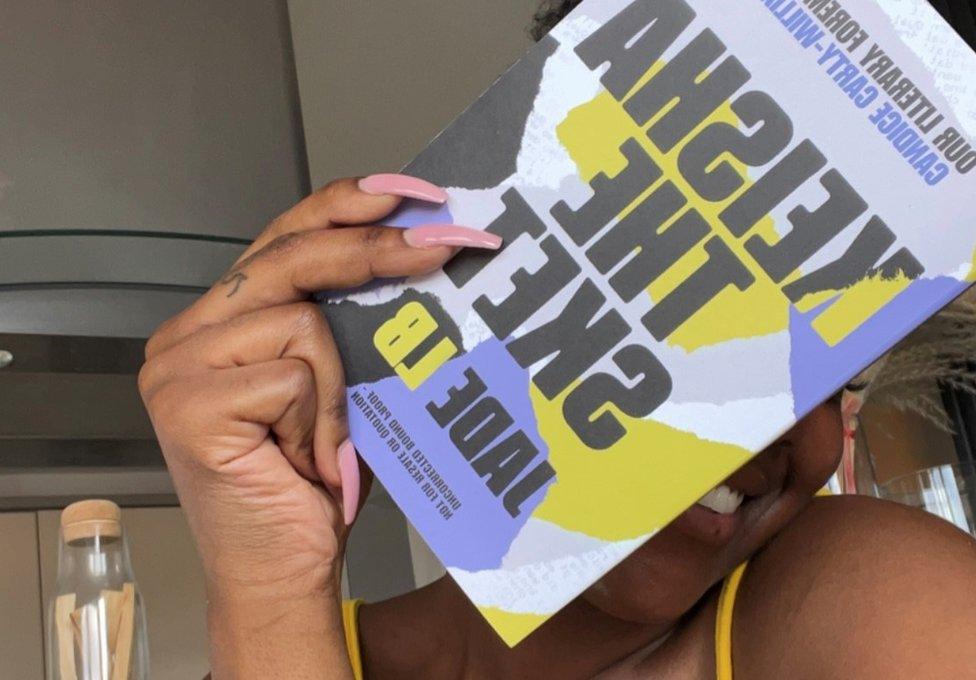Keisha the Sket author says she felt shame at her viral story
- Published

Jade LB's not ready to fully reveal her identity - but she's opened up about her book
When Jade LB was given a laptop for her 13th birthday, she sat in her home in Hackney, north-east London, and began writing a story. Her main character was 17-year-old Keisha, a black girl from inner city London whose life was full of sex, violence and alcoholism.
It was 2005 and Jade didn't have internet at home, so at first the story of "Keisha the Sket" lay dormant on her laptop's notes page.
A year later, she posted chapters on social media site Piczo.
The story - written almost entirely in text speak and London slang - began to gain traction.
In lunch breaks at school, pupils with enough credit on their phone would pass chapters on to one another.
The story was sent from friendship group to friendship group via BlackBerry messenger, Bluetooth, and MSN, across London and beyond.
Before the age of shares, likes, and retweets, Keisha's story had gone viral.
'It went against the grain'
The appetite for new chapters of the story was so big, Jade says she even received "threatening messages" hurrying her to post the next part.
Now, it's a fully formed book, being published by Stormzy's branch of Penguin Random House, Merky Books.
Jade's always kept her identity private but for the first time, she's spoken out about what the writing process was like.
Allow X content?
This article contains content provided by X. We ask for your permission before anything is loaded, as they may be using cookies and other technologies. You may want to read X’s cookie policy, external and privacy policy, external before accepting. To view this content choose ‘accept and continue’.
Allow X content?
This article contains content provided by X. We ask for your permission before anything is loaded, as they may be using cookies and other technologies. You may want to read X’s cookie policy, external and privacy policy, external before accepting. To view this content choose ‘accept and continue’.
Jade tells Radio 1 Newsbeat the honest way she wrote about women's sexuality "went against the grain".
"It went against what young boys at the time were learning - they were learning that girls aren't sexual."
The story describes Keisha's first sexual encounters in graphic detail.
It tells of her inner turmoil at developing a sexual appetite, but not wanting to appear a "sket" - a slang word for a promiscuous woman - among boys in her area.
Jade says she was writing about "a world [she] was observing".
'I felt shame'
But as the story reached more people, Jade became more and more concerned about what's she'd written.
"I really felt shame," she says.
"Particularly with guys, I thought 'Oh my god, you know, I've written about sex'.
"[Keisha] is considered promiscuous. I presumed it would [appear to be] a reflection of me, and it would be a lot of work to persuade someone otherwise."
Jade stopped telling anyone that she was the writer, and hoped nobody else would bring it up.
But over the past decade, conversation on social media has sporadically turned to the legendary story.
And Jade would get messages from friends from time to time to tell her that her character was, yet again, trending on Twitter.
She continued to keep a low profile while people online pondered who was behind their favourite nostalgic story.
Allow X content?
This article contains content provided by X. We ask for your permission before anything is loaded, as they may be using cookies and other technologies. You may want to read X’s cookie policy, external and privacy policy, external before accepting. To view this content choose ‘accept and continue’.
Allow X content?
This article contains content provided by X. We ask for your permission before anything is loaded, as they may be using cookies and other technologies. You may want to read X’s cookie policy, external and privacy policy, external before accepting. To view this content choose ‘accept and continue’.
Allow X content?
This article contains content provided by X. We ask for your permission before anything is loaded, as they may be using cookies and other technologies. You may want to read X’s cookie policy, external and privacy policy, external before accepting. To view this content choose ‘accept and continue’.
As Jade got older, she started going to therapy.
There, she explored why she had supressed her link to the story for so long.
'It's a time capsule'

Jade still wants to keep some anonymity about who she is
In the end, she decided she was ready to come back to it.
And she wasn't short of offers.
The book has now been published by Merky Books.
It comprises of a reflective author's note, the original script in text speak from 2005, and a rewrite in standard English.
Jade says: "I wanted to leave it raw as it was, because it's a time capsule. It's got nostalgic value."
She hopes publishing both versions of the book will make it "able to be accessed by way more people".

Jade wrote the original story in the era of text slang, when everyone used as few characters as possible to keep phone credit costs down

Reading back some of the scenes made Jade "really stunned by [by her] apparent savviness".
"After the gang assault, Keisha effectively goes back to some semblance of normalcy," Jade writes in the prologue.
"At the time, I didn't feel very hyper aware of these things."
Jade says the reason she kept the plot line the same is because it draws on real experiences of young black women.
"That's the truth, and that's what happens. Girls that look like me and Keisha bury violations and move on."
'Understanding stories invokes empathy'
Over the past 10 years, Jade has gained two degrees and worked with young women at risk of sexual exploitation.
She currently teaches African politics part-time at a London university.
"I've got a very different understanding of the world of my own girlhood, of girlhood more generally, I've had so many different experiences.
"I thought it was important to retell the story and add some layer and texture. I wrote some things out from under my skin."
Jade says she's an "advocate" for telling stories from "marginalised communities", something Merky Books prides itself on.
She says: "There is a way in which understanding people and understanding people's stories and where they come from invokes empathy."


Follow Newsbeat on Instagram, external, Facebook, external, Twitter, external and YouTube, external.
Listen to Newsbeat live at 12:45 and 17:45 weekdays - or listen back here.
Related topics
- Published20 January 2020

- Published16 October 2019

- Published6 June 2019
